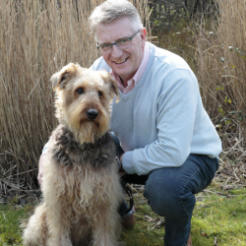The RSPCA is sorry for its mistakes, and will become less adversarial and “a lot less political” in the future, its new chief executive has said.
In an interview with the Daily Telegraph last Friday, Jeremy Cooper (pictured) issued a dramatic apology for the charity’s past actions, including the removal of pets from family homes and prosecution of pet owners over the health of elderly pets.
Cooper, who joined the charity last month, publicly distanced himself from past actions, admitting the RSPCA had become too adversarial under previous leadership.
“Of course we have made mistakes in the past, and we are very sorry about that. We have to be honest and admit the mistakes and acknowledge them. For me it is about recognising those mistakes and then doing everything we can to prevent them happening again,” he told the Telegraph.
“We are going to be a lot less political. It doesn’t mean we won’t stand up for animals. But we are not a political organisation. My style of advocacy is encouragement and dialogue. The [previous] leadership was too adversarial. If you want to shout and use rhetoric that’s fine but it isn’t helpful to anybody. It is not going to make friends and influence people. People won’t like you for it.”
The charity was criticised for bringing a series of prosecutions against pet owners and hunts – including a prosecution costing £330,000 against the Heythrop Hunt in Oxfordshire.
On Friday, Cooper said the charity was “very unlikely” to bring any further prosecutions against a hunt.
Instead, all future decisions on fox-hunting prosecutions would be passed to the Crown Prosecution Service, he said.
“We will investigate where we have been told that illegal hunting is taking place,” Cooper said, “But we will then pass on our findings to the authorities to determine the right course of action.
“We have to trust that where this is clear breach of the law, and it is in the public interest, then the appropriate authorities will take action. As with any organisation or citizen we reserve the right to take action if the authorities fail to act, but we expect that to be very unlikely.”
'Unfair'
Last year prosecutions by the RSPCA led to 1,781 convictions. But Cooper said the figure would now fall.
“The perception is we have been over zealous. That’s a little bit unfair,” he said. “I would like to see the number of prosecutions come down. Prosecutions have to be appropriate. We should look to fall back on education and advice wherever possible. It needs to be appropriate, measured and balanced in terms of our response.”
The charity has had a tumultuous couple of years since the resignation of its previous chief executive Gavin Grant, two years ago. Three trustees recently resigned citing problems with the way the charity was run - prompting the Charity Commission to order an independent governance review.
Cooper was previously chief executive of RSPCA Assured – the charity’s ethical food label - and director of corporate development for the RSPCA.
Speaking on his appointment, Cooper said the charity was a "unique" organisation with a "long and proud history".
"To have been given the opportunity to lead the organisation responsible for giving so many animals a second chance of the life they deserve is a huge honour," he said.
“I want to continue the process of ensuring the RSPCA is a modern, outward looking organisation with a clear purpose and built on strong values. My role will be to ensure we have a strategic plan that allows us to rescue as many animals in need as possible and to prevent cruelty wherever it takes place.”
Backlash
Following the Telegraph's article a number of people criticised the comments. An online petition calling for Cooper to be sacked has attracted almost 7,000 signatures.
A spokeswoman for the RSPCA told Civil Society News it "accepted it sometimes got the tone wrong" but said it would "make no apologies for prosecuting people in instances where there is clear evidence of animal cruelty".
"We can assure you the RSPCA remains as committed as ever to speaking out for vulnerable animals. We make no apologies for our campaigning work which has resulted in the introduction and amendment of many laws to protect our pets, wildlife, farm animals and animals used in research.
"Following an independent review of our prosecution activity and in line with one of the recommendations of that review, RSPCA trustees agreed to change its policy and to pass suitable cases involving traditional hunts and suitable farm cases to the police for investigation enabling the Crown Prosecution Service to prosecute if appropriate. However, we reserve the right to proceed with such investigations, if the authorities fail to act."
The spokeswoman said the charity stands by its successful prosecution of the Heythrop Hunt.
"We are also pleased that the number of prosecutions have dropped over recent years, highlighting that welfare is improving and educational messages are more available. We hope this is a trend that will continue," she said.
But she apologised for the "specific incidents where we have got it wrong".
"As a charity we have limited resources and we are dealing with huge numbers of calls. We apologise for past mistakes where an investigation wasn’t carried out to the standard we would hope, both for the animal involved and their owners. The RSPCA has and always will be committed to tackling cruelty to animals."









